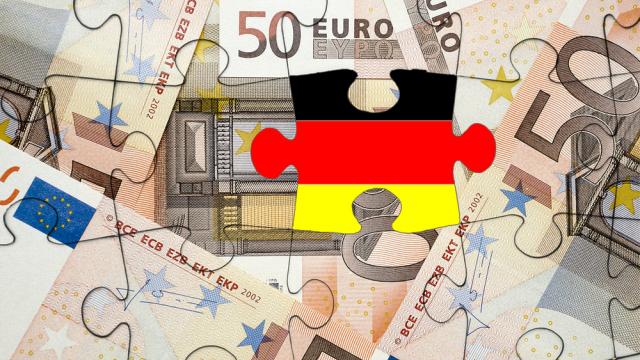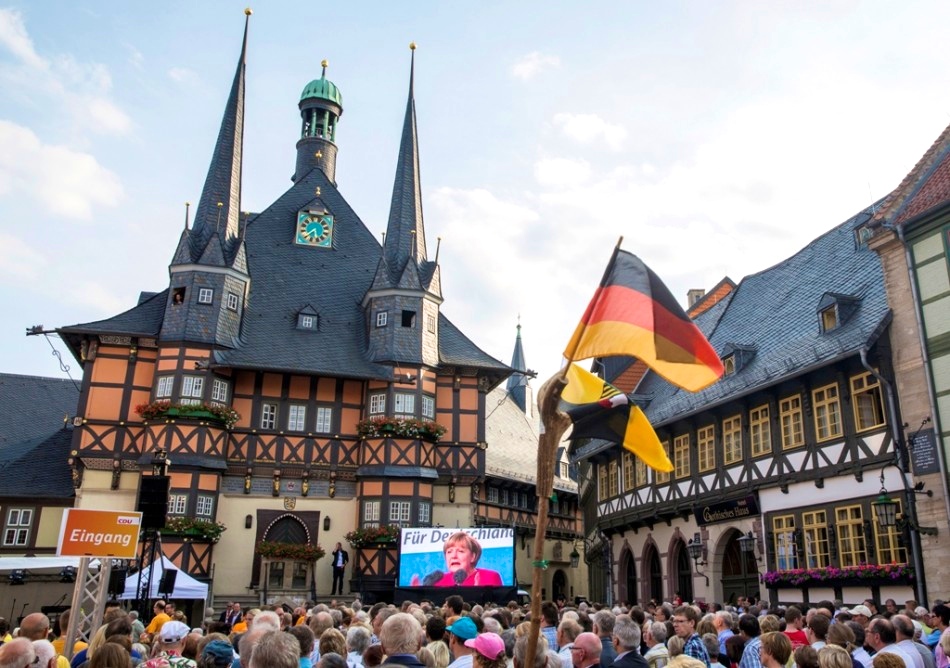
BERLIN—At a pre-election, townhall-style meeting with incumbent Chancellor Angela Merkel this summer, a young woman stood up and complained to the German leader about her low-wage temporary job, expressing concerns over her precarious future.
Be glad you have a job, Merkel told her. “Any job is better than no job."
Her response reflected a mentality which seems better suited to times gone by. Or does it? At first glance, the German economy is doing quite well. Unemployment is under 7 percent, not far from its lowest level since reunification, and there is a widespread sense — bolstered by outlets like The New York Times and The Economist — that Germany is leading the EU’s first tentative steps out of the worldwide financial crisis.
Things are going especially well for the country’s elites — Germany’s 100 richest individuals grew significantly richer from October of 2012 to October of 2013, Deutsche Welle recently reported.
But despite the increasingly positive outlook, some in Germany are complaining that the country is weakening the backbone of its economic prowess: a sturdy, decades-long pact between employers and employees that has resulted in robust worker protections, a well-trained workforce and levels of company loyalty stronger than just about anywhere else in the world.
In the wake of sweeping "Agenda 2010" reforms passed by former Chancellor Gerhard Schröder in 2003 — which, among other things, lowered taxes, cut welfare benefits and made it easier to fire employees — an increasing number of workers are getting caught up in cycles of temporary and low-wage work.
Take Frank, for example, an employee who asked that his last name not be used. He’s a 28-year-old living in Berlin who has assembled machine parts for a major German firm since February of 2012. Frank doesn’t work for the firm directly, but was connected to it via a temporary employment agency. He’s no stranger to the pitfalls of temporary work, which he saw firsthand during an earlier stint as a car mechanic.
“I was too expensive for [my boss] and he fired me to get a Polish worker who worked for two-thirds of what I got,” Frank said. “So he kicked me out, and since then I have just worked for a temporary employment agency.”
At the moment, Frank is working more or less full-time, though the number of hours varies by the week. It’s nonetheless a precarious situation. “If we don’t have any work anymore, my boss can come to me and tell me, 'I don’t need you tomorrow,' and then basically I have no job,” Frank said. Luckily, he’s in the final stages of an interview process to be brought on as a standard employee, and hopes to have a full-time job to show for his 20 months of work for the agency.
But many Germans aren’t so lucky. Stuck in a seemingly endless temp-employment loop, they are unable to attain the stability that conventional workers enjoy, said Simone Blum-Geenen who works on the “Equal Work – Equal Pay” campaign at IG Metall, the largest metalworker’s union in Germany.
The result, she said, is a dualization of German labor. Those with standard employment contracts enjoy all the benefits of secure, full-time employment, while temporary workers do not. “We have a two-class system, and we, as union representatives, don’t want the workers to be separated in two classes,” said Blum-Geenen.
Temporary workers “earn less money, they have less protection,” she added. For this group, “to plan your life, to buy a flat or a house, it’s very difficult to get the money.”
Ben, 26, living in the city of Bochum, would agree. Before he got a full-time job at a local political office in Essen, he had spent two years as a “minijobber,” a marginal employment category introduced in the 2003 reforms in which participants earn up to 400 euros a month, tax-free, while employed in part-time work.
Among other jobs, he had worked at a drugstore, a supermarket and at an information booth in a museum, always making between 7.50 and 8.50 euros an hour, and going without vacation (full-time employees in Germany get around six weeks a year). Ben was often forced to take the shifts other full-time employees didn’t want.
He said that whether or not Germany’s economy is doing well completely depends on your vantage point.
“If you ask someone who is working in the supermarkets, the discounters, they will tell you that they’re paid low, that they don’t have enough money for vacation,” he said. “When you’re speaking with someone from eastern Germany, from the former German Democratic Republic (GDR), they’re always telling you that everything was better before [reunification]."
Even higher education is no longer enough to shield people from the economic and political forces changing the face of labor across the country. “In Germany, in the past, if you went to university and got your Masters, you would get a job," said Ben. "But now? Even that is not certain.” One example is Ben’s girlfriend, who has a Masters degree. She has been looking for work for a year but has only been able to get internships, in a cycle termed locally as the Praktikantkultur (intern culture). She’s currently making 700 euros a month.
The story of the increasing divide in German labor resembles what has happened in the U.S. and other nations where inequality is steeply on the rise. But what makes it particularly troubling is that Germany historically has done a better job withstanding these forces than other economic powerhouses. As one 2010 report on Germany's rising inequality, produced by the Bonn-based Institute for the Study of Labor, puts it: “Germany is one of the countries whose wage and income distribution seemed remarkably stable for a long time.”
Prior to 2000, for example, the country’s GINI coefficient, a well-respected measure of income inequality, had remained within a stable range for decades. Since 2000, however, it shot upward and appears to have stabilized at a new, significantly higher level since 2006.
Moreover, the German system has traditionally been built on a cooperative relationship between labor and management, in which workers’ positions were for the most part secure. That model still exists if you’re lucky enough to be a skilled worker employed by a large firm. But for an increasing number of Germans the security is elusive; more and more face lower wages and less protection.
Gerhard Bosch, director of the Institute for Work, Skills and Training at the University of Duisburg-Essen, echoed the idea of a two-track labor system. “What we have is a dualist model right now,” he said. “In certain core sectors, we still have the old German model of decent wages, good vocational training, and trustful relations between the social partners. But we have sectors where we lost this. “
In 2011, according to data compiled by Bosch,15.6 percent of workers in western Germany and 29.4 percent of workers in much poorer eastern Germany made less than 8 euros per hour. Bosch concluded that the country had a “very fast-growing low-wage sector.” Real average wages dropped in Germany between 2000 and 2010, while the number of temporary employees shot up from 286,000 to 822,000 between the years 1999 and 2012 — a rise of 187 percent. The number of mini-jobbers rose from 3.9 million to 4.9 million during this period.
There is still public-policy disagreement over what, exactly, allowed Germany to weather the crisis relatively smoothly. Those who favor continued liberalization say that if not for Agenda 2010, Germany would be in a much weaker position today. It’s no accident that a Wall Street Journal headline from last year dubbed former Chancellor Schröder “The Man Who Rescued the German Economy.”
Many center-right and right-leaning figures and groups have “tried to push the Agenda 2010 as the outstanding reform that has made Germany overcome the drop in economic output after the financial crisis,” Daniel Mertens, a researcher at the Max Planck Institute for the Study of Societies, wrote in an email.
But, he argued, the reality is more complicated and there are other factors. A major one, cited by both Mertens and other experts, was Kurzarbeitergeld — the government subsidies given to companies that agreed to reduce the hours of their workers rather than fire them outright in the wake of the crisis. The result is that Germany, unlike the U.S., did not have to deal with the outward-radiating impacts of mass layoffs.
Another key point, Mertens wrote, is that “economic growth in the past decade has heavily relied on exports,” even as “concerns about sluggish domestic demand have become more pronounced.”
“It so happens that Germany produces exactly what emerging markets want,” said Waltraud Schelkle, who studies political economy at the London School of Economics. He cited capital goods and luxury cars as two prime examples.
The picture that is painted, then, is one of a nation that has shifted more and more of its respected, high-quality manufacturing jobs to low-paid workers who lack employment protection and purchasing power, enabling the economy to continue to benefit from an export-friendly global trade environment.
In other words, things could continue to get harder and harder for many Germans without it necessarily showing up in the biggest, most well-known economic statistics. Economists and financial analysts could continue touting Germany as a “model” or a “success” without fully understanding, or taking into account, the price of that success: that one of the world's former great economies now boasts an army of low-paid workers in an increasingly entrenched two-track labor system.
3 WAYS TO SHOW YOUR SUPPORT
- Log in to post comments













